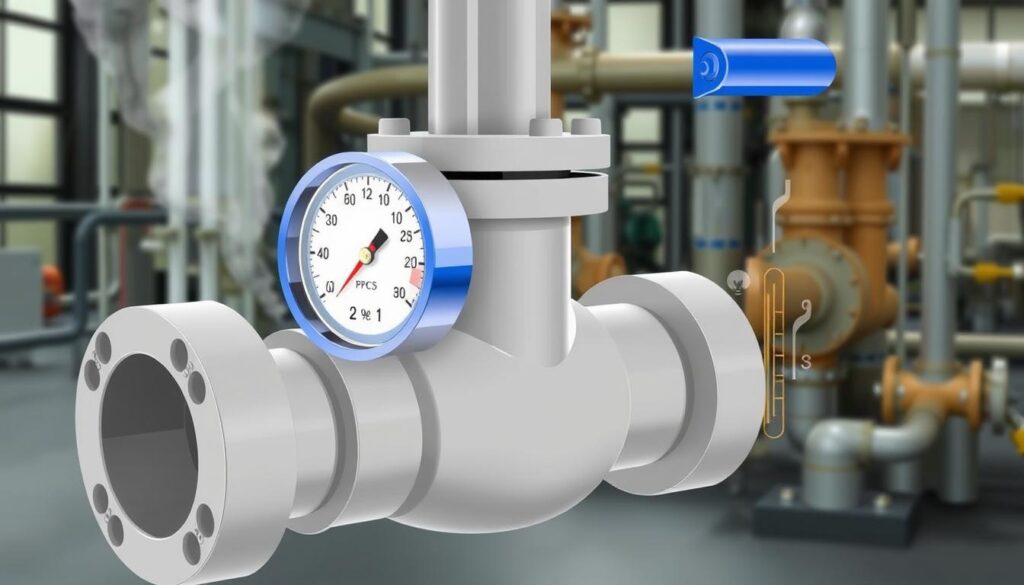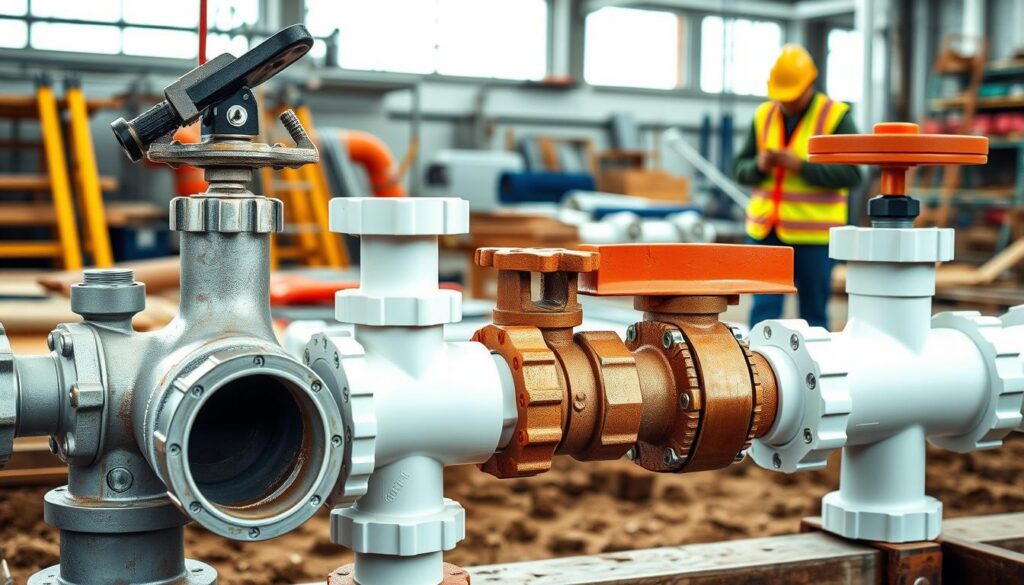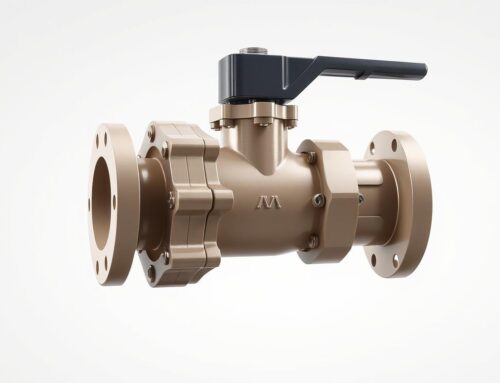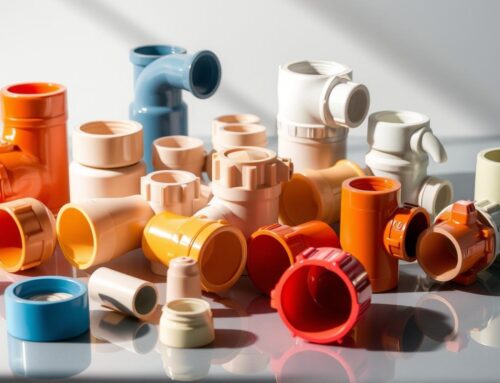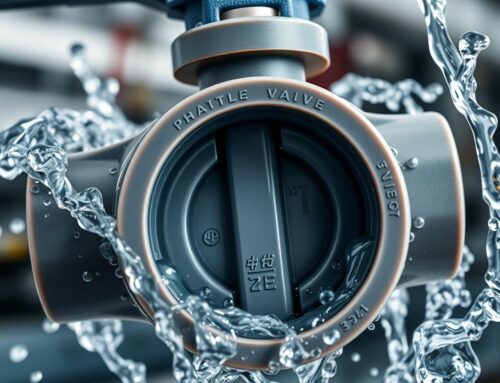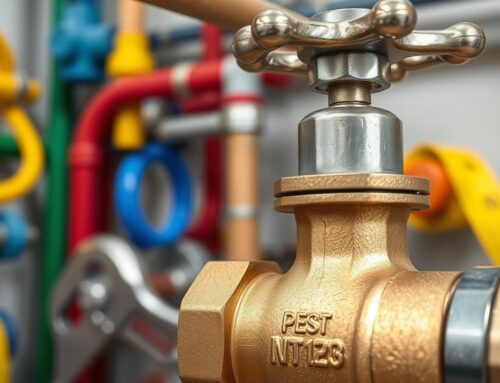As the manufacturing industry continues to demand reliable and versatile valve solutions, the Schedule 80 PVC valve emerges as a standout choice. Crafted from custom PVC compound blends, these valves offer a unique combination of physical properties that make them ideally suited for a wide range of industrial applications. From chemical processing to aquaculture and water treatment, the Schedule 80 PVC valve is designed to withstand diverse temperature and pressure requirements while providing exceptional corrosion resistance for long-lasting performance.
The rigid PVC material used in the construction of these valves allows them to handle pressure well, with a temperature resistance up to 140°F (60°C). This makes them a popular choice for industrial settings where durability and reliability are of the utmost importance. Whether you’re managing a chemical delivery system, maintaining a potable water system, or operating a chilled water system, the Schedule 80 PVC valve can be the perfect fit for your needs.
Key Takeaways
- Schedule 80 PVC valves are engineered for heavy-duty industrial applications
- Crafted from custom PVC compound blends for exceptional durability and corrosion resistance
- Suitable for a wide range of industries, including chemical processing, water treatment, and aquaculture
- Capable of handling diverse temperature and pressure requirements up to 140°F (60°C)
- Offer a cost-effective and long-lasting solution for industrial valve needs
Understanding Schedule 80 PVC Components
Schedule 80 PVC, a specialized type of PVC piping, is engineered to provide superior durability and performance in demanding industrial environments. Unlike its more commonly known counterpart, Schedule 40 PVC, the Schedule 80 variant features a thicker wall construction that enhances its ability to withstand higher pressures and temperatures.
Material Composition and Manufacturing Process
The key to Schedule 80 PVC’s strength and longevity lies in its custom-blended PVC compound. Manufacturers carefully formulate this material to meet rigorous industry standards, ensuring it can stand up to the challenges of high-pressure environments. The manufacturing process involves precise extrusion techniques that produce the thick-walled tubing, providing a robust foundation for industrial applications.
Thickness and Durability Standards
Compared to Schedule 40 PVC pipes, Schedule 80 PVC boasts significantly thicker walls, with a minimum thickness of 0.218 inches for a 2-inch pipe. This increased wall thickness translates to greater resistance to bending, cracking, and other forms of physical stress, making Schedule 80 PVC an ideal choice for high-pressure PVC piping and high-pressure fittings applications.
Quality Control Measures
To ensure the consistent quality and reliability of Schedule 80 PVC components, manufacturers implement rigorous quality control measures throughout the production process. This includes stringent inspections, material testing, and ongoing monitoring to validate that each piece meets the necessary specifications and standards for industrial plumbing supplies. The result is a durable, high-performance solution that can be trusted in even the most demanding industrial environments.
Core Features of Schedule 80 PVC Valve Systems
Schedule 80 PVC valve systems are engineered to deliver exceptional performance in a wide range of industrial applications. These flow control devices are renowned for their superior corrosion resistance, ensuring leak-free operation throughout the system’s service life. The strength and durability of Schedule 80 PVC valves make them a popular choice for demanding drainage systems and industrial valve requirements.
The key to the success of Schedule 80 PVC valve systems lies in their specialized material composition and manufacturing process. These valves are crafted from high-quality PVC formulations that exhibit exceptional chemical and corrosion resistance, safeguarding against degradation in harsh environments. The thicker walls of Schedule 80 PVC components provide enhanced pressure-handling capabilities, empowering these valves to operate effectively in high-pressure fluid handling applications.
One of the standout features of Schedule 80 PVC valve systems is their ease of installation. These components can be quickly and efficiently joined using a proven two-step solvent welding process, facilitating seamless integration into new or existing piping networks. This straightforward installation process helps to minimize downtime and streamline the implementation of Schedule 80 PVC valve solutions.
| Feature | Benefit |
|---|---|
| Corrosion Resistance | Ensures leak-free operation and long service life |
| Pressure Handling Capabilities | Effective flow control in high-pressure fluid systems |
| Easy Installation | Streamlined integration using solvent welding process |
By combining these core features, Schedule 80 PVC valve systems deliver a comprehensive solution for flow control, drainage, and industrial valve requirements. Whether you’re managing a chemical processing facility, a water treatment plant, or an aquaculture operation, these durable and reliable valves can provide the performance you need to optimize your industrial processes.
Temperature and Pressure Capabilities
Schedule 80 PVC valves demonstrate exceptional temperature resistance, capable of withstanding fluids at service temperatures up to 140°F (60°C). This makes them a suitable choice for a wide range of industrial applications that demand high-temperature performance, such as chemical processing, water treatment, and aquaculture systems.
Maximum Temperature Ratings
PVC thermoplastic can handle fluids at service temperatures up to 140°F (60°C), ensuring reliable operation in a variety of industrial environments. In contrast, CPVC (Chlorinated Polyvinyl Chloride) can handle even higher temperatures, up to 210°F (99°C), making it a suitable alternative for applications with more extreme temperature requirements.
Pressure Handling Specifications
In addition to their impressive temperature capabilities, Schedule 80 PVC valves are engineered to withstand high-pressure environments. The smooth interior walls of PVC fittings result in lower pressure loss and higher volume compared to conventional metal fittings, ensuring efficient fluid flow and reduced pressure drop throughout the system.
Operating Condition Guidelines
To ensure optimal performance and longevity, it’s essential to follow the recommended operating condition guidelines for Schedule 80 PVC valve systems. These guidelines take into account factors such as temperature, pressure, and chemical compatibility to ensure the valves operate safely and reliably within their specified parameters.
| Material | Maximum Temperature | Pressure Rating | Chemical Resistance |
|---|---|---|---|
| PVC | 140°F (60°C) | Up to 150 psi | Excellent for a wide range of chemicals |
| CPVC | 210°F (99°C) | Up to 200 psi | Excellent for a wide range of chemicals, including high-strength acids and bases |
By understanding the temperature and pressure capabilities of Schedule 80 PVC valves, manufacturers and engineers can make informed decisions to optimize their industrial processes and ensure the long-term reliability of their high-pressure fittings and heavy-duty valves.
Corrosion Resistance Properties
The rigid PVC material used in Schedule 80 valves provides superior corrosion-resistant properties, eliminating corrosion-related leaks throughout the system’s lifespan. This makes them an ideal choice for use in aggressive chemical processing environments and water treatment facilities, ensuring long-term reliability and reduced maintenance requirements.
PVC is highly resistant to acids, alkalis, alcohols, and many other corrosive materials, making it a versatile material for industrial applications that demand corrosion resistance. The increased thickness and durability of Schedule 80 PVC further enhances its ability to withstand harsh conditions, providing enhanced protection against physical damage and corrosion-related issues.
| Material Property | Specification |
|---|---|
| Maximum Operating Temperature | 140°F (60°C) |
| Maximum Pressure Rating | 220 PSI |
| Pipe Size | 14 inches |
| Wall Thickness | 0.75 inches |
| Material Weight | 20.852 lbs./ft. |
| Inner Diameter | 12.41 inches |
| Outer Diameter | 14 inches |
The corrosion-resistant nature of Schedule 80 PVC valves makes them an ideal choice for a wide range of industrial applications, including chemical processing systems, water treatment facilities, and other environments where exposure to aggressive chemicals or corrosive agents is a concern.
“The rigid PVC material used in Schedule 80 valves provides superior corrosion resistance, ensuring long-term reliability and reduced maintenance requirements in industrial settings.”
Industrial Applications and Use Cases
Schedule 80 PVC valves find extensive use in various industrial sectors, offering reliable performance and durability in demanding applications. These valves play a crucial role in chemical processing solutions, water treatment systems, and aquaculture implementations, showcasing their versatility and suitability for diverse industrial needs.
Chemical Processing Solutions
In the chemical processing industry, Schedule 80 PVC valves are invaluable components, providing reliable fluid control in corrosive environments. Their exceptional chemical resistance ensures safe and efficient handling of a wide range of chemicals, making them indispensable for processes such as chlor-alkali production, acid and base neutralization, and wastewater treatment within chemical plants.
Water Treatment Systems
Schedule 80 PVC valves are crucial in water and wastewater treatment systems, ensuring efficient fluid control and management. Their durability and corrosion resistance make them ideal for applications ranging from municipal water treatment facilities to industrial water reclamation projects. These valves help maintain the integrity of the water treatment process, contributing to the delivery of safe, clean water.
Aquaculture Implementation
In the aquaculture industry, Schedule 80 PVC valves play a vital role in water management and circulation systems. Their ability to withstand the harsh aquatic environment, combined with their resistance to corrosion and degradation, makes them a reliable choice for controlling water flow, regulating oxygen levels, and maintaining optimal water quality in fish farms, shellfish hatcheries, and other aquaculture facilities.
| Industrial Application | Key Features | Benefits |
|---|---|---|
| Chemical Processing | Chemical resistance, durability, corrosion resistance | Reliable fluid control in harsh chemical environments, safe handling of corrosive substances |
| Water Treatment | Corrosion resistance, durability, efficient fluid control | Maintain integrity of water treatment processes, ensure delivery of clean, safe water |
| Aquaculture | Corrosion resistance, durability, water management capabilities | Reliable control of water flow and quality in aquatic environments, support optimal conditions for aquaculture operations |
Installation and Joining Methods
Seamless integration and reliable performance are essential when implementing PVC piping and plumbing supplies in industrial settings. Schedule 80 PVC valves are designed with a straightforward, two-step solvent welding process that ensures a robust, leak-proof connection between components. This installation method is engineered for efficiency, minimizing downtime and reducing labor costs for manufacturing professionals.
The key steps in the solvent welding process for Schedule 80 PVC valves include:
- Preparing the pipe and valve ends by cleaning and applying a primer to the surfaces.
- Applying a high-quality solvent cement to both surfaces and quickly joining the components together, allowing them to cure for the recommended time.
This proven approach creates a strong, permanent bond that can withstand the demanding operating conditions found in many industrial applications. By following best practices and manufacturer guidelines, users can ensure a successful and long-lasting installation of their Schedule 80 PVC valve systems.
To enhance the installation process, some additional considerations include:
- Maintaining recommended temperature and pressure ratings for storage and application of solvent cements and primers.
- Utilizing specialized cutting tools, such as carbide-edged blades and adjustable strain wrenches, to ensure clean, square cuts and secure pipe connections.
- Adhering to all safety precautions when handling flammable solvent cement products.
By following these guidelines, manufacturing professionals can confidently install Schedule 80 PVC valves and integrate them into their industrial plumbing supplies systems, ensuring reliable performance and long-term durability.
Schedule 80 PVC Valve Selection Guide
When it comes to flow control devices and industrial valves, Schedule 80 PVC valves offer a durable and versatile solution. These valves are designed to handle a wide range of applications, from chemical processing to water treatment systems. To ensure optimal performance and system compatibility, it’s crucial to understand the various valve types, configurations, and size selection criteria.
Valve Types and Configurations
Schedule 80 PVC valves come in a variety of types and configurations to meet diverse system requirements. Some of the commonly used valve options include:
- Ball valves: Offering efficient flow control and tight shutoff capabilities.
- Check valves: Preventing backflow and ensuring unidirectional flow.
- Gate valves: Providing reliable isolation and flow regulation.
These valves can be further customized with features such as manual, pneumatic, or electric actuation, depending on the specific application needs.
Size Selection Criteria
Selecting the right size of a Schedule 80 PVC valve is essential for ensuring optimal system performance. The size selection process takes into account several factors, including:
- Flow rate: Evaluating the required flow capacity to meet the system’s demands.
- Pressure requirements: Assessing the pressure handling capabilities of the valve to withstand the system’s operating conditions.
- Application-specific needs: Considering the unique requirements of the specific industrial application, such as chemical compatibility or temperature resistance.
By carefully considering these criteria, manufacturers and engineers can choose the appropriate Schedule 80 PVC valve size to optimize the overall system’s performance and efficiency.
| Valve Type | Pressure Rating | Temperature Range | Key Applications |
|---|---|---|---|
| Ball Valve | Up to 150 psi | 0°C to 82°C | Chemical processing, water treatment, general industrial |
| Check Valve | Up to 150 psi | 0°C to 82°C | Fluid control, backflow prevention, pumping systems |
| Gate Valve | Up to 200 psi | 0°C to 82°C | Isolation, flow regulation, industrial piping systems |
By understanding the available valve types, configurations, and size selection criteria, manufacturers and engineers can make informed decisions when choosing Schedule 80 PVC valves for their flow control and industrial applications.
Maintenance Requirements and Best Practices
Maintaining the performance and longevity of your industrial valves is crucial for efficient operations. Fortunately, Schedule 80 PVC valves require minimal maintenance due to their exceptional corrosion-resistant properties. However, following a few simple best practices can help ensure these durable components continue to function reliably for years to come.
Regular inspections are recommended to check for any signs of wear or damage, such as:
- Cracks or deformations in the valve body or components
- Buildup of debris or corrosion
- Proper sealing and operation of the valve mechanism
To prolong the life of your Schedule 80 PVC valves, it’s important to avoid over-tightening the connections during installation. Using the appropriate lubricants and following the manufacturer’s guidelines for operation and maintenance will also help prevent premature wear or failure.
| Valve Type | Maintenance Requirements |
|---|---|
| One-Piece PVC Ball Valves | Threaded or socket-style, with differences in maintenance approaches between the two |
| True Union PVC Ball Valves | Growing in popularity due to efficient maintenance and easy disassembly for cleaning |
By adhering to these simple maintenance best practices, you can ensure your industrial valves and plumbing supplies continue to deliver reliable performance and maximum return on your investment.
Comparison with Other Valve Materials
When evaluating industrial valve options, Schedule 80 PVC valves offer a compelling cost-benefit proposition compared to other materials such as metal or high-density polyethylene (HDPE) pipes. Despite their lower initial cost, PVC valves provide superior corrosion resistance and long-term durability, making them a practical choice for a wide range of industrial applications.
Cost-Benefit Analysis
The cost per foot for Schedule 80 PVC valves is significantly lower than that of Schedule 80 CPVC, a key advantage for cost-conscious industrial projects. Additionally, the installation process for PVC valves is generally simpler and more straightforward, further contributing to the overall cost-effectiveness of PVC as a valve material.
Performance Metrics
In terms of performance, Schedule 80 PVC valves demonstrate impressive capabilities. They can handle maximum working pressures comparable to Schedule 80 CPVC, making them suitable for high-pressure applications. Furthermore, the tensile strength of Schedule 40 PVC exceeds that of Schedule 40 CPVC, indicating superior durability. PVC’s temperature tolerance, while lower than CPVC, can still meet the requirements of many industrial settings, including chemical processing, water treatment, and aquaculture systems.
FAQ
What are the key features of Schedule 80 PVC valves?
Schedule 80 PVC valves are manufactured from custom PVC compound blends, offering unique physical properties ideal for various industrial applications. They can handle diverse temperature and pressure requirements and demonstrate excellent corrosion resistance, ensuring long-lasting performance.
What is the material composition and manufacturing process of Schedule 80 PVC valves?
Schedule 80 PVC components are made from custom blends of PVC compounds, engineered for superior durability and performance. The manufacturing process ensures thick-walled construction, meeting stringent durability standards, and rigorous quality control measures are implemented to maintain consistent product quality.
What are the temperature and pressure capabilities of Schedule 80 PVC valves?
Schedule 80 PVC valves demonstrate excellent temperature resistance up to 140°F (60°C) and are engineered to withstand high-pressure environments, making them suitable for demanding industrial applications. Specific operating condition guidelines ensure optimal performance and longevity of the valve systems.
How do Schedule 80 PVC valves offer corrosion resistance?
The rigid PVC material used in Schedule 80 valves provides superior corrosion resistance, eliminating corrosion-related leaks throughout the system’s lifespan. This property makes them ideal for use in aggressive chemical environments and water treatment facilities, ensuring long-term reliability and reduced maintenance requirements.
What are the common industrial applications for Schedule 80 PVC valves?
Schedule 80 PVC valves find extensive use in chemical processing industries, water and wastewater treatment systems, and aquaculture applications, offering reliable performance in corrosive environments and ensuring efficient fluid control.
How are Schedule 80 PVC valves installed?
Schedule 80 PVC valves can be easily installed using the proven two-step solvent welding process, which ensures a strong, leak-proof connection between components. The installation process is designed for efficiency, reducing downtime and labor costs in industrial settings.
What types of Schedule 80 PVC valves are available, and how are they selected?
A comprehensive range of Schedule 80 PVC valve types and configurations is available, including ball valves, check valves, and gate valves, among others. Size selection criteria are based on factors such as flow rate, pressure requirements, and specific application needs, ensuring optimal system performance.
What maintenance requirements and best practices are associated with Schedule 80 PVC valves?
Schedule 80 PVC valves require minimal maintenance due to their corrosion-resistant properties. However, regular inspections and proper handling procedures are recommended to ensure long-term performance, including avoiding over-tightening, using appropriate lubricants, and adhering to manufacturer guidelines.
How do Schedule 80 PVC valves compare to other valve materials in terms of cost-effectiveness and performance?
When compared to other valve materials such as metal or HDPE, Schedule 80 PVC valves offer a compelling balance of cost-effectiveness and performance. They provide superior corrosion resistance and durability at a lower cost than many metal alternatives, with performance metrics demonstrating their advantages in various industrial applications.


